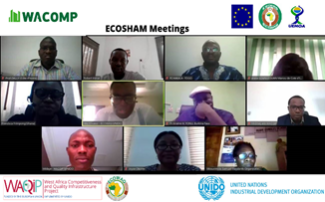UNIDO to play a key role in harmonizing standards in response to COVID-19 across West Africa
As part of its contribution to the fight against the COVID-19 pandemic, the West Africa Competitiveness and Quality Infrastructure Project (WACQIP) proposed a contingency plan focusing on the necessity of ensuring the quality of products used in the context of barrier measures. One of the priorities of this plan is the development of standards and a Conformity Assessment Scheme on protective masks and hydro-alcoholic gels.
The West Africa Competitiveness and Quality Infrastructure Project (WACQIP) is the regional component of the West Africa Competitiveness Programme (WACOMP), implemented by UNIDO and financed by the European Union (EU).
Within this framework, the WACQIP organized an online meeting of the Technical Management Committee (TMC) of the ECOWAS mechanism for the Harmonization of Standards (ECOSHAM) with a view to proposing the elaboration of key standards on the requirements, methods of testing, making and use of non-sanitary masks and the specifications and method of testing of hydro alcoholic products. As a result of this meeting, a working group on Textile & Garment (WG-T&G) was established, taking charge of the drafting of the ECOWAS standard (called ECOSTAND) on barrier masks for non-sanitary use, while the one on hydro alcoholic products was entrusted to the Technical Harmonization Committee on Chemistry (THC3). Further technical exchanges were organized online and despite the challenging circumstances, such as stability of internet connection and simultaneous interpretation in English and French, about 100 participants fruitfully took part in the discussions. The results of the public inquiry on the two draft ECOSTAND standards, launched in the Member States as part of an emergency procedure, have been validated and will be submitted to the vote by the 15 National Standards Bodies.
In line with these recent activities, WACQIP will further support the conceptualization and implementation of complementary measures such as accreditation of conformity assessment bodies, development of certification, testing and inspection schemes at regional, as well as country level, through those WACOMP projects being implemented by UNIDO, in particular Ghana, Sierra Leone, Guinea, Guinea Bissau and The Gambia.
Read the full article here.
For more information, please contact: Bernard Bau (B.Bau [at] unido.org (B[dot]Bau[at]unido[dot]org)) and Aka Jean Joseph Kouassi (A.Kouassi [at] unido.org (A[dot]Kouassi[at]unido[dot]org))

